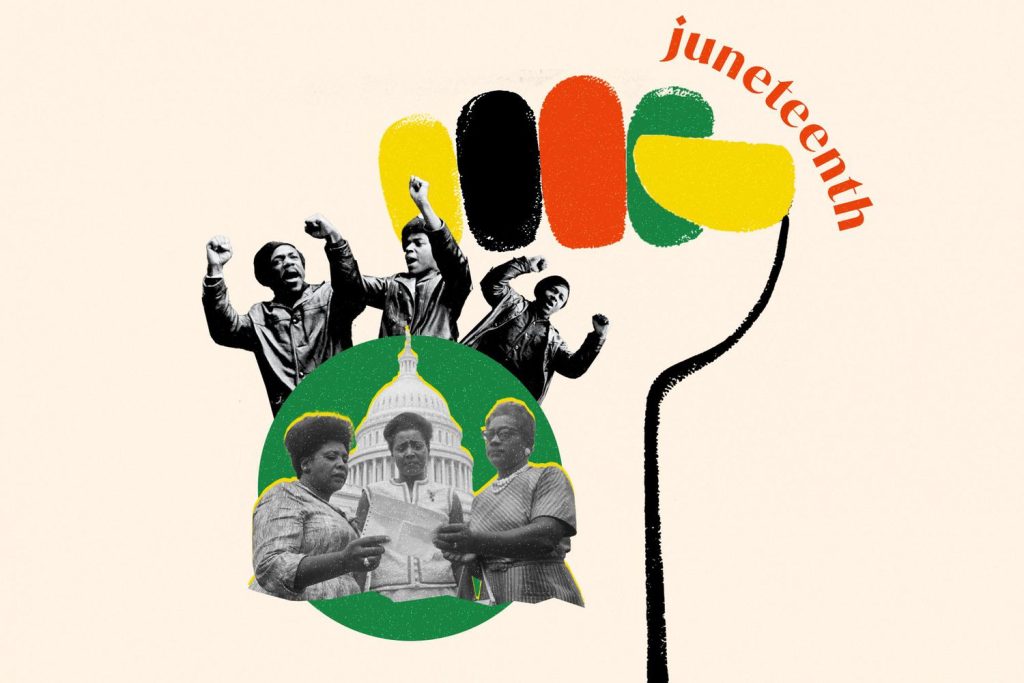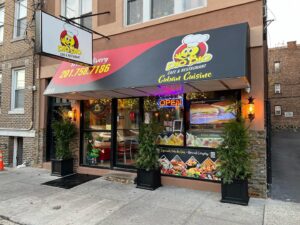PHOTO: GETTY / PHOTO ILLUSTRATION BY JO IMPERIO.
Juneteenth is about Black resilience and freedom, that’s how Black In Jersey founder and head of editorial, Tennyson Donyea, described it.
Juneteenth–short for June 19th–celebrates the past, present and future of African Americans after enslaved people were finally freed. But how can we really celebrate this holiday? What’s the importance of storytelling from a Black perspective? And how did Jersey save him?
He answers it here for us!

What’s good! I’m Tennyson Donyea, and I wear mad hats behind the scenes at Black In Jersey.
I’m the founder and head of editorial. I also help develop and facilitate reporting training and coaching. When I’m not handling operations, I enjoy shooting our video content. For example, we partnered with a Camden nonprofit to produce a documentary dropping later this year, and I’m the lead cinematographer on the project.

I soft-launched Black In Jersey as a social media page to highlight my work covering culture and race in New Jersey back in 2020 during the so-called “summer of protests.”
At the time, I was super fed up with how legacy media, including many outlets I had worked at, didn’t center Black experiences in their news products. I worked in several places where staff was blatantly told that because our primary consumers were white middle-class people, that’s who we had to think about when producing content — even to the point where some editors made me feel like I needed to over-explain certain cultural references or water down certain messages.
Couple that with the fact that there’s a lot of distrust around mainstream media, especially in our communities. I was inspired by Black icons like Toni Morrison, who was criticized by her contemporaries for centering Black narratives as mainstream. I wanted to create a space where local Black stories were considered mainstream.

My default response when asked how others feel would be to ask them 🙂 But jokes aside, people have shared that they connect with the work. It’s “for us by us,” and I think people appreciate that. I love when journalists of color are inspired by the work, and I hope that one day I’ll be able to create more opportunities for media makers and creatives who don’t want to go the traditional route like I did for so long.

Media literacy is crucial in our digital age where information is abundant yet often unchecked. Understanding how to critically evaluate media content is essential for distinguishing between credible information and misinformation. For Black communities, media literacy holds even greater significance due to the historical and ongoing misrepresentation in mainstream media.
Media literacy empowers individuals to deconstruct stereotypes and challenge narratives that have long been perpetuated about Black people. It allows us to reclaim our stories, ensuring they are told authentically and accurately, rather than through a biased lens. This reclamation is vital for fostering a sense of identity and pride within the community, while also educating broader audiences about our diverse experiences and contributions.
Storytelling, particularly from Black perspectives, is a powerful tool for both preservation and progress. It preserves our histories, cultures, and traditions that might otherwise be overlooked or forgotten. More importantly, it provides a platform for voices that have been historically marginalized. By telling our own stories, we can highlight the complexities and richness of Black life, breaking away from monolithic and often negative portrayals.

Jersey saved my life.
It changed me and continues to mold me for the better. I made friends and mentors here who helped me find my purpose after years of meandering through my career, especially after spending the first half “paying my dues” in some of the least diverse places in the country. It was nice to feel like I found a home. I’ve lived all over Jersey—Jersey City, East Rutherford, Trenton—and they’ve all felt like home in ways I didn’t receive in places like Maine, Northern California, and Scranton, PA, despite the wonderful people there.
Those experiences made me cherish my culture and my people even more.

Juneteenth celebrates Black freedom and resilience, marking the end of slavery in the U.S. However, the struggle for liberation is ongoing.
We must address the enduring legacy of colonialism and corporate greed that continues to impact our communities. This day is not just about commemorating the past but also a call to action to fight systemic injustices and build a more equitable future. By recognizing and confronting these issues, we can honor our history and work toward true liberation and justice for as many people as possible..

A key focus should be advocating for reparations to address historical injustices and promote long-term equity and justice.
Attend community gatherings, parades, and festivals that honor Black culture and history. Support Black-owned businesses by shopping at their stores and dining at their restaurants. Engage in educational activities like workshops, lectures, and discussions about Black history and the ongoing struggle for racial equality. Enjoy art and music performances by Black artists, poets, and musicians. Participate in community service initiatives that support and uplift Black communities. Heavy on the support reparations. So much of the last few years of advocacy and solidarity has felt performative, especially from politicians and corporations.
To check out more of Black in Jersey’s work, visit their website.












